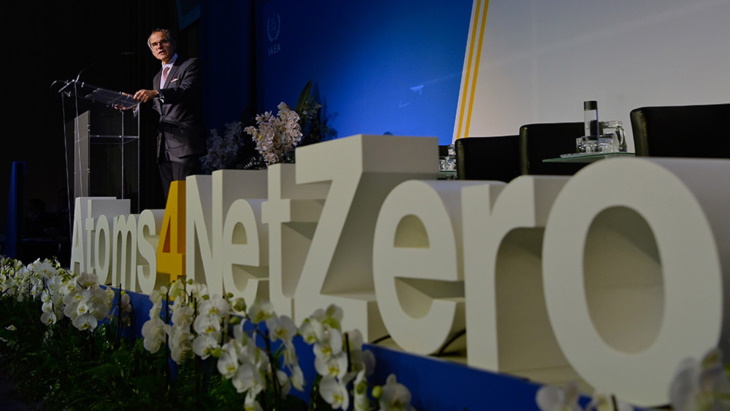
In the latest edition of its annual Energy, Electricity and Nuclear Power Estimates for the Period up to 2050, the IAEA has revised upwards its global growth projections for a third straight year. In both its high and low case scenarios, the IAEA now sees a quarter more nuclear energy capacity installed by 2050 than it did as recently as 2020.
In the high case scenario of the new outlook, nuclear installed capacity is seen more than doubling by 2050 to 890 GWe, compared with the current 369 GWe. In the low case, capacity increases to 458 GWe. Compared with last year's outlook, the high and low cases have risen by 2% and 14%, respectively.
In 2021, the IAEA revised up its projections for the first time since the 2011 accident at the Fukushima Daiichi plant in Japan. Since the 2020 outlook, the high case projections to 2050 have now increased by 178 GWe, a 24% increase. The report's low case projections have seen even higher growth of about 26%.
"More and more countries are considering or already embarking upon the introduction or expansion of nuclear power, amid mounting concerns not only over climate change, but also energy access and security of energy supply," IAEA Director General Rafael Mariano Grossi told delegates at the opening session of the 2nd International Conference on Climate Change and the Role of Nuclear Power in Vienna.
He added: "Our new projections are only slightly above what the International Energy Agency, in its latest Net Zero Roadmap released last week, sees as the required contribution of nuclear power to achieve the Paris Agreement's goal of limiting the rise in global temperatures to 1.5°C above pre-industrial levels."
"Despite the optimistic outlook, challenges inherent in climate change, financing, economic considerations, and supply chain complexities persist and might hamper the industry's growth," the IAEA warned. "While international collaboration and other efforts are under way to overcome these obstacles ... much remains to be done to achieve a fair and enabling investment environment for new nuclear projects."
"'Nuclear is too expensive and too slow' is a false narrative. 'Nuclear energy or renewables' is a false narrative," Grossi said. "Those false narratives are to the detriment of everyone, especially when it comes to achieving a fair and enabling investment environment for new nuclear projects. We are not at a level playing field yet when it comes to financing nuclear projects. I believe international financial institutions, development banks, and private banks and investors should take a fresh look at this issue. We know that nuclear power is a winning investment for the environment and for energy access and security of supply. It can also be a winning financial investment over the long term."
Grossi said financing decisions need to be taken from a "technologically agnostic view that is based on science, fact and reason. Outdated ideology and misplaced fear should not stand in the way. Nuclear power needs to be regarded simply as a viable low-carbon technology".
He added: "To be pro-nuclear is to be pro-environment. To be pro-nuclear is to be in favour of wise investments. To be pro-nuclear is to take our long-term responsibility to this planet and its future generations seriously."
World Nuclear Association Director General Sama Bilbao y León, also speaking at the conference, said there was a clear need for action to address the climate emergency. "We need to be taking major decisions now to minimise the damage that is already being done to our ecosystems, and ensure we have a cost-effective decarbonisation strategy that makes the best use of limited resources."
She added: "If we are going to achieve a net-zero economy by 2050, we are going to need a huge expansion in nuclear capacity. This is not just to supply more clean electricity; the potential of nuclear technology goes far beyond this, helping to decarbonise the entire economy."
Nuclear technologies can help achieve environmental goals while also accelerating socio-economic development and increasing quality of life and equity for all, she added. "But this political will must be turned into urgent action to deliver practical programmes of new build and to extend the operation of our existing nuclear plants. Governments may set the policy to facilitate the investment, but it will be the nuclear industry that will be responsible for delivering this expansion in global nuclear capacity."
Bilbao y León highlighted the Net Zero Nuclear initiative launched in early September by World Nuclear Association and the Emirates Nuclear Energy Corporation, with support from the IAEA's Atoms4NetZero and the UK government. It aims to ensure that nuclear energy's potential is fully realised in facilitating the decarbonisation of global energy systems by promoting the value of nuclear energy and removing barriers to its growth especially in the run-up to COP28.
"This goal of reaching a tripling of nuclear capacity [by 2050] is not driven by a selfish desire to benefit the nuclear industry, it is what needs to be done to deliver nuclear technology so that people can enjoy the benefits it will deliver, and live in a cleaner planet," she said.
Presiding over the conference - being held 9-13 October - UAE Permanent Representative to the IAEA, Ambassador Hamad Al Kaabi said: "The conference is an ideal opportunity to discuss relevant policies and strategies with international stakeholders and exchange expertise on the role of nuclear energy in addressing climate change and mitigating its impacts in order to promote sustainability through long-terms strategic projects."